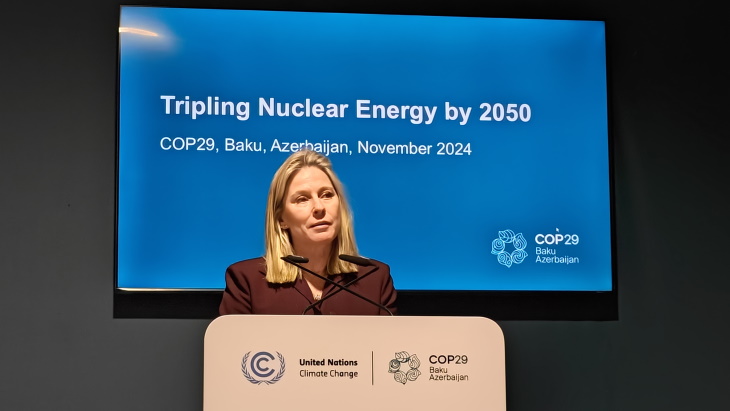MIT: Slow growth of nuclear could harm climate efforts
The rate of deployment of new nuclear power plants around the world has been much slower than needed in order to combat climate change, the Massachusetts Institute of Technology (MIT) said in an update of its in-depth study on the future of nuclear power.
The rate of deployment of new nuclear power plants around the world has been much slower than needed in order to combat climate change, the Massachusetts Institute of Technology (MIT) said in an update of its in-depth study on the future of nuclear power.
The 2003 edition of the Future of Nuclear Power report said "that in order to make a serious contribution to alleviating global climate change, the world would need new nuclear plants with a total capacity of at least a terawatt [1000 gigawatts] by 2050."
In its updated study, MIT says, "Since the 2003 report, interest in using electricity for plug-in hybrids and electric cars to replace motor gasoline has increased, thus placing an even greater importance on exploiting the use of carbon-free electricity generating technologies."
It added, "With regard to nuclear power, while there has been some progress since 2003, increased deployment of nuclear power has been slow both in the United States and globally, in relation to the illustrative scenario examined in the 2003 report."
MIT noted, "While the intent to build new plants has been made public in several countries, there are only few firm commitments outside of Asia, in particular China, India, and Korea, to construction projects at this time. Even if all the announced plans for new nuclear power plant construction are realized, the total will be well behind that needed for reaching a thousand gigawatts of new capacity worldwide by 2050."
In its updated study, MIT says that, compared to 2003, "the motivation to make more use of nuclear power is greater, and more rapid progress is needed in enabling the option of nuclear power expansion to play a role in meeting the global warming challenge." It added, "The sober warning is that if more is not done, nuclear power will diminish as a practical and timely option for deployment at a scale that would constitute a material contribution to climate change risk mitigation."
Construction costs up
The latest study noted that, "Since 2003 construction costs for all types of large-scale engineered projects have escalated dramatically. The estimated cost of constructing a nuclear power plant has increased at a rate of 15% per year heading into the current economic downturn. This is based both on the cost of actual builds in Japan and Korea and on the projected cost of new plants planned for in the United States. Capital costs for both coal and natural gas have increased as well, although not by as much. The cost of natural gas and coal that peaked sharply is now receding. Taken together, these escalating costs leave the situation [of relative costs] close to where it was in 2003."
According to MIT's study, the overnight capital cost of constructing a nuclear power plant is $4000 per kilowatt (kW), in 2007 dollars. This compares with a figure of $2000/kW, in 2002 dollars, given in the original 2003 study.
The updated study says that, applying the same cost of capital to nuclear as to coal and gas, nuclear came out at 6.6 c/kWh, coal at 8.3 cents and gas at 7.4 cents, assuming a carbon charge of $25 per tonne of CO2 on the latter.
[The updated study can be downloaded from MIT's website]

_99697.jpg)

_53540.jpg)





_66488.jpg)


